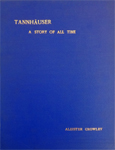100th
MP

|
THE
100th
MONKEY
PRESS |
|
|
|
Limited Editions by Aleister Crowley & Victor B. Neuburg |
|
Bibliographies |
|
Download Texts
»
Aleister
Crowley
WANTED !!NEW!!
|
|
TANNHÄUSER |
|
Image Thumbnails |
||||||||||||||||||||||||||||||||||||||||||||||||||||||||||||||
|
Title: |
Tannhäuser. A Story of All Time. |
|
||||||||||||||||||||||||||||||||||||||||||||||||||||||||||||
|
Variations: |
|
|||||||||||||||||||||||||||||||||||||||||||||||||||||||||||||
|
Publisher: |
Society for the Propagation of Religious Truth (S.P.R.T.).1 |
|||||||||||||||||||||||||||||||||||||||||||||||||||||||||||||
|
Printer: |
Turnbull and Spears, Edinburgh.4 |
|||||||||||||||||||||||||||||||||||||||||||||||||||||||||||||
|
Published At: |
Boleskine, Foyers, Inverness.1 |
|||||||||||||||||||||||||||||||||||||||||||||||||||||||||||||
|
Date: |
1907.1 |
|||||||||||||||||||||||||||||||||||||||||||||||||||||||||||||
|
Edition: |
“New” Edition. |
|||||||||||||||||||||||||||||||||||||||||||||||||||||||||||||
|
Pages: |
142 + ii.2 |
|||||||||||||||||||||||||||||||||||||||||||||||||||||||||||||
|
Price: |
Priced at 15 shillings.3 |
|||||||||||||||||||||||||||||||||||||||||||||||||||||||||||||
|
Remarks: |
Title-page states ‘A New Edition’.3 This edition is comprised of the unsold, unbound pages left over from the original 1902 Kegan Paul, Trench, Trübner & Co. edition with a new S.P.R.T. title page bound in.5 Crowley was disappointed with Kegan Paul's management of his book sales and closed his account with them in May of 1904. Between 1902 and 1904, Kegan Paul had only managed to sell ten copies of Tannhäuser. This spurred Crowley's decision to distribute his works himself through S.P.R.T.7 Crowley supposedly composed this book in one uninterrupted 67 hour long bout of writing.6 |
|||||||||||||||||||||||||||||||||||||||||||||||||||||||||||||
|
Pagination:2 |
|
|||||||||||||||||||||||||||||||||||||||||||||||||||||||||||||
|
Contents: |
- Dedication - Preface - Tannhäuser - Epilogue |
|||||||||||||||||||||||||||||||||||||||||||||||||||||||||||||
|
Author’s Working Versions: |
|
|||||||||||||||||||||||||||||||||||||||||||||||||||||||||||||
|
Other Known Editions: |
|
|||||||||||||||||||||||||||||||||||||||||||||||||||||||||||||
|
Bibliographic Sources: |
|
|||||||||||||||||||||||||||||||||||||||||||||||||||||||||||||
|
Comments by Aleister Crowley: |
My poetry at this time is charged to the highest point with these aspirations. I may mention the dedication to Songs of the Spirit, “The Quest”, “The Alchemist”, “The Philosopher’s Progress”, “A Spring Snowstorm in Wastdale”, “Succubus”, “Nightfall”, “The Storm”, “Wheat and Wine”, “Vespers”, “Astrology” and “Daedalus”. In “the Farewell of Paracelsus to Aprile”, “The Initiation”, “Isaiah” and “Power”, I have expressed my ideas about the ordeals which might be expected on the Path. All these poems were published in 1898. In later volumes, Mysteries Lyrical and Dramatic, The Fatal Force, The Temple of the Holy Ghost and Tannhäuser, these ideas are carried further in the light of my practical experience of the Path. — The Confessions of Aleister Crowley. New York, NY. Hill and Wang, 1969. Page 146-147. ______________________________
At “Marlborough” we found the conditions for work very favourable. The first step was to get rid of all other preoccupations. I revised Tannhäuser, wrote an introduction, typed it all out and sent it to the press. — The Confessions of Aleister Crowley. New York, NY. Hill and Wang, 1969. Page 238. ______________________________
During this retirement I was fortunate in being under the constant vigilant supervision of Allan Bennett, whose experience enabled him to detect the firs onset of disturbing ideas. For instance, the revising and typing of Tannhäuser were quite sufficient to distract my mind from meditation, and would even upset me in such apparently disconnected matters as Pranayama. — The Confessions of Aleister Crowley. New York, NY. Hill and Wang, 1969. Page 238. ______________________________
There remain my narrative and dramatic books on love. The Tale of Archais is simply jejune; I apologize and pass on. The Mother’s Tragedy, “The Fatal Force”, Jezebel, Tannhäuser, all treat love not as an object in itself, but on the contrary, as a dragon ready to devour any one less than St. George. — The Confessions of Aleister Crowley. New York, NY. Hill and Wang, 1969. Page 556-557. |
|||||||||||||||||||||||||||||||||||||||||||||||||||||||||||||
|
Reviews: |
This is really a tremendous poem. Not only is it printed upon paper twice the size of that which meaner poets use, but also its scheme, which embraces the pursuit of man, in the person of Tannhaüser, after Supreme Knowledge, appears to be commensurate with the whole. Mr. Crowley, as he is good enough to inform us, speaks “both in Hebrew and Egypto-Christian Symbology” and his work is less a drama than a monodrama, and “really a series of introspective studies; not necessarily a series in time, but in psychology, and that rather the morbid psychology of the Adept than the gross mentality of the ordinary man.” Not being experts in the psychology of the Adept, we must content ourself with saying that to our gross mentality the adventures of Tannhaüser with the true and the false Aphrodite-Hathoor are exceedingly tedious, and that Me. Crowley’s chief poetic merit appears to be a certain facility in reproducing the emptier melodies of Mr. Swinburne. A short example will perhaps suffice;—
Come, love, thy bosom to my heart recalls Strange festivals and subtle funerals. Soft passion rises in the amber walls, And falls! None but the dead can breathe the life of love!
Come, love, thy lips, curved hollow as the moon’s! Bring me thy kisses, for the seawind tunes The song that soars and reads the starry runes, And swoons! None but the dead can tune the lyre of love!
Come, love! My body in thy passion weeps Tears keen as dewfall’s, salter than the deep’s. My bosom! How its fortress wakes, and leaps, And sleeps! None but the dead can sleep the sleep of love!
Come, love, caress me with endearing eyes! Light the long rapture that nor fades nor flies! Love laughs and lingers, frenzies, stabs, and sighs! And dies! None but the dead can know the worth of love!
It is fair to add that, although “Tannhaüser” is not wholly free from morbidity, it does not reach the extreme of unpleasantness to be found in some of Mr. Crowley’s earlier works. —The Academy and Literature, 9 August 1902. ______________________________
Mr. Aleister Crowley is an ambitious poet. In Tannhäuser: a
Story of All Time (Kegan Paul) he essays no less a theme
than the life-history of a soul in the pursuit of the eternal
and the real. This is shadowed forth with a good deal of what
he chooses to call “Hebrew and Egypto-Christian symbology”—if
the term is used at all, it should surely be symbolology—and in
the somewhat longwinded and inflated style with which his
readers are probably by this time familiar. We do not think Mr.
Crowley rises to the height of his great argument, but he avoids
some of the worst eccentricities of the last volume of his verse
which came before us. ______________________________
On consideration we are not disposed to adopt all the strictures on “Tannhäuser: a Story of All Time,” by Aleister Crowley, which the author suggests in his foreword to the reviewers. But for all his shouts of “Fore!” we cannot quite get out of his way. His metrical version of the legend is excellent—in parts, of course. But for ourselves we prefer the greater simplicity of Wagner, and we cannot refrain from availing ourselves of the permission which he expressly gives us “to conclude the review of this book by quoting from Act III.: “Forget this nightmare.” But it is, to use paradox, an agreeable nightmare. (Kegan Paul, Trench, Trübner, and Co.) —The St. James's Gazette, 23 June 1902. ______________________________
Mr. Allister [sic] Crowley appends to his Tannhäuser, a Story of All Time (Kegan Paul and Co., pp. 112, 5s.) a collection of abbreviated press notices in which he is variously described as a “true poet” or as “a windbag foaming at the mouth.” In his preface he speaks of this work as nearly identical in scheme with the “Pilgrim’s Progress,” though “literary and spiritual experts” may detect minor differences in treatment. “Tannhäuser” may perhaps be described, in brief, as an epitome of Mr. Crowley’s own spiritual adventures, and if he may be accused of egoism it is fair to admit the plea that a man’s study of typical mankind must be founded on himself. Certainly Mr. Crowley is not hampered by the prevalent indolence disguised as modesty that will not permit a man to take himself seriously. His drama is intensely serious, and is idealized out of all semblance to humanity. We read of a love that is
No petty passion like these country-folk’s, No fertile glory (as the Love of God), But vast and barren as the winter sea,
and the whole poem seems to be another expression of the struggle between an ascetic ideal and the senses, rejecting the social compromise as unworthy of the passionate alternations. Mr. Crowley in his preface warns the judicious reviewer that, in spite of certain passages of a frenzied sensuality, he must not be ranked as a sensualist. It may be granted that this poem is essentially a product of the mind, a search for the absolute pursued by means of symbols and images when a more direct expression becomes inadequate. Such a curious conjunction of fancy and speculation requires, we think, verse of more elasticity than Mr. Crowley has at his command. He writes with considerable power and without reserves and too strenuously for beauty. Nevertheless he is at his best in grandiose or extravagant passages such as Tannhäuser’s story of the Creation, and perhaps at his worst in the more moderate and logical dialogue with Elizabeth, which becomes very bald and prosaic. His verse is wanting in seduction, in charm, and in commanding rhythms. Beside Mr. Swinburne’s, with which it has been compared, much of it is little more that metricised prose. Mr. Crowley claims to be one who “strangely and desperately dares to force a passage into the penetadia of nature; not with the calm philosophy of the scientist, but with the burning conviction that his immortal destiny is at stake. The outcome seems to be obscure, but in these slack days the effort may be respected. —The Manchester Guardian, 21 August 1902. ______________________________
A remarkable “Pilgrim’s Progress” in dramatic form. This work may be regarded as the culmination of the Author’s powers in lyrical and dramatic work: he has apparently said the last word possible on the subject of Regeneration. The Cambridge Review prefers “the vigour of Mr. Crowley’s “Tannhäuser” to the Attic monotone of the Master (Swinburne). —The Cambridge Review, date unknown. ______________________________
Such magnificence of paper, print, and margin, that we trust we are right in assuming that he is possessed of material wealth even greater than the wealth of languages, which he displays so profusely throughout the volume. With all these attractions, he nevertheless fails to stir at all deeply. —The Pall Mall Gazette, date unknown. ______________________________
We are not sure that Mr. Aleister Crowley treats life as a sacrament, because we do not understand him. —The Daily Chronicle, date unknown. |
|||||||||||||||||||||||||||||||||||||||||||||||||||||||||||||



